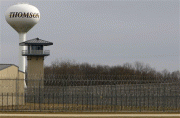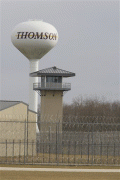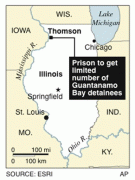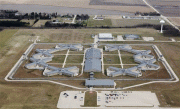

In this Monday, Nov. 16, 2009 file photo, the Thomson Correctional Center, is seen in Thomson, Ill. The Thomson Correctional Center was one of several potential sites evaluated by the Federal Bureau of Prisons but has emerged as a leading option to house detainees held at Navy-run prison in Guantanamo Bay, Cuba.


Map locates Thomson, Illinois, where a prison will receive Guantanamo Bay detainees.In this Monday, Nov. 16, 2009 file photo, an aerial view of the Thomson Correctional Center is seen in Thomson , Ill. The Thomson Correctional Center was one of several potential sites evaluated by the Federal Bureau of Prisons but has emerged as a leading option to house detainees held at Navy-run prison in Guantanamo Bay, Cuba.
The White House said Tuesday that it will move its war court from Guantánamo Bay, Cuba, to an underused prison in Illinois, but officials couldn't say how soon or at what cost.
Administration officials declined to estimate how many of the 210 detainees at Guantánamo would move to the Thomson Correctional Center, but White House press secretary Robert Gibbs said he wouldn't dispute an estimate by Sen. Dick Durbin, D-Ill., of about 100 detainees.
A letter to Illinois Gov. Pat Quinn and a presidential memorandum made official Tuesday the federal government's intention to acquire the largely empty maximum-security facility about 150 miles west of Chicago.
Many Illinois officials and congressional Democrats support the idea, but Republicans cite concerns about Americans' safety.
Senate Minority Leader Mitch McConnell, R-Ky., said the American people "already have rejected bringing terrorists to U.S. soil."
Rep. Mark Kirk, R-Ill., who is seeking Obama's old Senate seat, said he believes moving Guantánamo detainees to Illinois will make the state a greater threat for terrorist attacks.
Quinn dismissed safety concerns, promising that the Thomson facility would be "the most secure prison of all time."
"It will pose no danger to the community," National Security Adviser James Jones said of the decision to move the detainees.
The Thomson facility will receive upgrades that take it beyond the security level at any current U.S. prison, including the nation's only "supermax" facility in Florence, Colo. Already built to maximum-security standards, the 146-acre Thomson facility will receive more upgrades from the Defense Department, including additional fencing and other security technology.
The Thomson facility was built by Illinois in 2001 as a state prison. Local officials hoped it would improve the area's economy, but state budget problems have kept the 1,600-cell prison from being fully used. It now houses about 200 minimum-security inmates.
Administration officials said they could not lay out a time frame for a transfer of detainees from the Navy-run detention center to Thomson. They said the administration would have to work with Congress to amend laws and secure funding before any prisoners are brought to U.S. soil.
Under the plan outlined Tuesday, the Thomson prison will be purchased by the Federal Bureau of Prisons and run primarily as a standard federal prison. A portion of the facility would be leased to the Defense Department to house a limited number of Guantánamo detainees.
A senior White House official said in a background briefing that the 146-acre prison was the intended site for commissions trials, meant for war-on-terrorism captives accused of committing war crimes.
The official also said the administration intended to transfer any so-called indefinite detainees – whom the president determines must be held indefinitely but cannot be tried – to the facility, which would require congressional action.
The letter to Quinn said acquiring Thomson would allow the federal government to carry out Obama's order to close the facility at Guantánamo, where suspected terrorists have been housed since 2002.
Of detainees still at Guantánamo, five have been designated for federal trial, with 25 under consideration. The Pentagon's chief war crimes prosecutor, Navy Capt. John Murphy, has said his staff is building war crimes court cases for as many as 55 of the 210 detainees now at Guantánamo.
Two senior administration officials, speaking on condition of anonymity, said current law would allow Guantánamo detainees awaiting military commission proceedings to be transferred to Thomson and would allow the facility to become the new site for those proceedings.
Guantánamo detainees awaiting prosecution through civilian courts would not go to Thomson but to the jurisdiction where they would be tried, such as alleged Sept. 11 mastermind Khalid Shaikh Mohammed and four fellow accused. Attorney General Eric Holder has said they will be tried in New York.
Detainees to be sent to other countries would stay at Guantánamo until their departure to those countries, the officials said.
he White House decision to move up to 100 Guantanamo Bay detainees to this dying Mississippi River town has folks here seeing dollar signs, not suspected terrorists.
Many people in this rural community are hopeful that their willingness to house the prisoners in a nearly empty penitentiary will offer an economic boost — helping to ease steep job losses and dwindling tax revenue needed to fix roads and pay for schools.
"This is probably the economic-development opportunity of a lifetime for northwest Illinois, and we intend to take full advantage of it," said Russ Simpson, who leads an economic-development group for a three-county area that includes tiny Thomson, about 150 miles west of Chicago.
Until now, the expansive Thomson Correctional Center has been a big disappointment in the town of about 450, where there are no stoplights and the two-block business district is lined with old-fashioned buildings that look like they belong on the set of a Western movie.
The prison was built by the state in 2001 with the promise of thousands of jobs, but budget problems prevented it from fully opening. It has 1,600 cells, but currently houses only about 200 minimum-security inmates and 82 staff members, according to the state.
Businesses opened in anticipation of an influx of prison workers and visitors, but they have since closed. Builders canceled plans to build new housing. Neighbors moved away to find better jobs.
The unemployment rate in Carroll County, where Thomson is located, stood at 11.1 percent in October, the latest month for which figures are available. The national average is 10 percent.
"It's been a big disappointment for eight years. Heartbreak," said Rick McGinnis, who owns Kyle's, a bar that has been in his family for 62 years. Now, he says, people will move to the area, put their children in school, pay taxes and buy beer.
"That's the best thing that could happen to it," said McGinnis, who remembers the good money his bar made when the prison was being built.
President Barack Obama ordered the federal Bureau of Prisons to buy the prison. The decision is an important step toward closing Guantanamo Bay, which has long been a global symbol of the Bush administration's approach to national security. The Illinois prison is expected to house both federal inmates and no more than 100 Guantanamo detainees.
But Tuesday's announcement will not solve all the administration's Guantanamo-related problems. More than 200 detainees will remain at Guantanamo, and the White House faces other legal issues and potential resistance from Congress.
Administration officials, speaking on condition of anonymity, said they could not yet lay out a time frame for the transfer of detainees from the Navy-run detention facility to Thomson.
They said the administration would have to work with Congress to amend laws and secure funding before any prisoners are brought to U.S. soil. They would also need to strengthen the prison's perimeter security.
The officials said military tribunals for potential detainees would be held at Thomson. They also said the facility could house detainees who are ordered to be held indefinitely but cannot be tried.
Federal and state officials estimate the federal takeover will create as many as 3,000 jobs in the area within several years, including an estimated 800 to 900 at the prison and at local businesses that would sprout up as a result.
"I hope it's a true Christmas," Village President Jerry Hebeler said. "Everybody's been down in the dumps for eight years."
While local officials and many Democratic lawmakers, including Illinois Sen. Dick Durbin and Gov. Pat Quinn, touted the plan as an economic boon, others warned it would make the state a target for terrorist attacks.
Republican Rep. Mark Kirk, who is seeking Obama's old Senate seat, has lobbied other officials to oppose the plan. On Tuesday, he issued a statement saying the administration has not adequately addressed safety concerns.
"Without a vote, public hearing or detailed plan, the administration is moving quickly to force the citizens of Illinois to accept this unnecessary risk," Kirk said.
But many here do not see it that way.
"There's the political side about whether the Guantanamo detainees should be brought to American soil, but once that argument is settled, we may as well have them here," said Todd Smith, who owns Buck's Barn Golf Resort, a recreational complex about two miles north of the prison with an 18-hole golf course, 53-room hotel and restaurant.
"Any place that would have been a good target for terrorist before won't change on the basis of where the prisoners are being held."
He had shelved plans to expand the business several years ago, but Tuesday's news "gives us a chance to dust those plans off" and maybe build new single-family homes around the golf course to house prison employees.
The Thomson Correctional Center was one of several potential sites evaluated by the Federal Bureau of Prisons to house detainees from the Navy-run prison at Guantanamo Bay.
Officials in Standish, Mich., hoped they would get some of the detainees at a maximum-security prison that was being closed to save money, but Michigan never rolled out the welcome mat the way some other states did.
McGinnis, the bar owner, said that if the federal government did not buy the prison, the town "probably would have died."
Lisa Johnson, who helps manage the Station convenience store in Thomson, says economic interests trump any lingering security concerns.
"Everybody's sick and tired of paying taxes on something that's not bringing in any revenue," she said. "Some people are afraid because they use the word terrorist. ... I'm concerned too, but now that the prison is here, fill it up."
-----------
--------
------------
RELATED POSTS:-
- Barack Obama’s deadline to bring troops home from Afghanistan starts to slip
- Somali suicide bomber detonate bom inside doc graduation ceremony.Murder 23 people.
- Obama sending 30,000 additional U.S. forces to Afganisthan in new plan
- Vatican and Muslims condemn Swiss minaret ban vote
- Terrorists Attack at Russian Train 26 dead 100 injured.Bom derail train at 130kmph.
- Prime suspect in Philippine massacre surrenders-A scion of a powerful clan surrendered for investigation for murder of 57 people massacre of unarmed .
- India remembers Mumbai attacks when gunman storm Mumbai bus station and hotel to shot people
- Indian PM offers hand to Obama-Pressure Pakistan handle counterterrorits more.Wary of US sided diplomat with Pakistan and China
- Security threats inside and out for 9/11 trial
- 3 survivors for Pearl Harbour recall attack
- Iraq reporter who throw shoe at Bush , get back own medicine.
- Tareq Salahi and Michaele Salahi alleged uninvited and not in guest list yet entered into high prolife dinner party in White House for PM India.
- Dubai debt fears remain focus in world markets-US, Emerging Market Stocks Slide as Bonds Advance on Dubai
- Shoppers pack stores as holiday season revs up
- Water On The Moon: LCROSS Kicks Ice!- Buckets of water found in Moon .
- 3months pregnant.Maj Hasan charge include murder unborn baby.Murder 14 victim.-Hasan had communications with Pakistan
- First picture of heroine of Fort Hood who took down gunman-Confront the Maj Hasan directly and open fire.Stopped carnage gun rampage.
- Detecting glimpses of humanity in DC sniper-Is to Be Executed on Tuesday
- U.S. had al Qaeda intelligence on Fort Hood shooter-Fort Hood suspect was reportedly e-mailing al-Qaeda supporter
- Fort Hood shooting suspect's ties to mosque investigated same mosque with 9 11 terrorists-Shouted Allah Akbar before gun rampage kill 13 wounds 31





0 comments:
Post a Comment